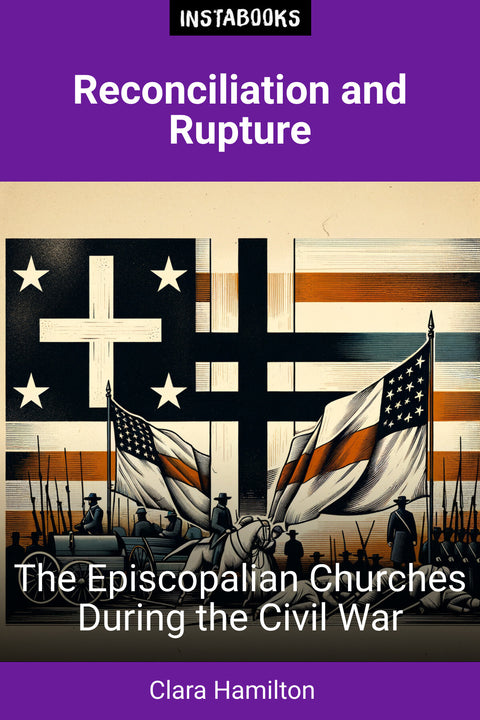
Reconciliation and Rupture
The Episcopalian Churches During the Civil War
Included:
✓ 200+ Page AI-Generated Book
✓ ePub eBook File — read on Kindle & Apple Books
✓ PDF Print File (Easy Printing)
✓ Word DOCX File (Easy Editing)
✓ Hi-Res Print-Ready Book Cover (No Logo Watermark)
✓ Full Commercial Use Rights — keep 100% of royalties
✓ Publish under your own Author Name
✓ Sell on Amazon KDP, IngramSpark, Lulu, Blurb & Gumroad to millions of readers worldwide
Introduction
Discover the intricate story of the Episcopalian churches during the tumultuous years of the American Civil War in "Reconciliation and Rupture". This book meticulously examines the formation of the Protestant Episcopal Church in the Confederate States and delves into the complex dynamics of faith, governance, and socio-political issues surrounding this pivotal period. By highlighting the broader historical context, readers will glean insights into how religion interplayed with America's most significant conflict.
Formation of the Protestant Episcopal Church
In response to the secession of Southern states, Episcopalians established the Protestant Episcopal Church in the Confederate States of America (PECSC). This landmark decision reflected a desperate attempt to maintain ecclesiastical integrity amid the threats posed by abolitionism. Detailed accounts of its constitution and governance reveal a church caught in the clash between tradition and turbulent societal change.
Constitution and Governance
The PECSC's drafting of its constitution and the convening of its first general council in 1862 marked a significant moment in ecclesiastical history. This book elaborates on the struggles faced in governance and the attempts to unify against a backdrop of conflict, detailing how these events shaped the church's future.
The Issue of Slavery
Slavery was an underlying issue that could not be ignored. Many church leaders framed slavery as a legal matter, failing to address its moral implications. A thorough exploration of the Episcopal Church's position on slavery, including pivotal moments like the General Convention of 1856, sheds light on the church's complicity in perpetuating a divisive institution.
Post-War Reconciliation and Racial Dynamics
After the war, the church faced a mass exodus of African Americans responding to its segregated practices. The formation of black congregations and the church's eventual reunification laid bare the tensions that simmered beneath the surface. Readers will understand how racial segregation and paternalism shaped the church's outreach to African American communities in the Reconstruction Era.
Conclusion
In conclusion, this book stands as a reminder of the ongoing struggles within religious communities regarding race, identity, and belonging. With comprehensive research and firsthand accounts, "Reconciliation and Rupture" not only illuminates a critical chapter in American history but encourages readers to reflect on the implications of these historic narratives in contemporary faith communities.
Table of Contents
1. The Birth of the PECSC- Context of Secession
- Founding Principles
- Key Bishops and Leaders
2. The Constitution of a Divided Church
- Drafting the PECSC Constitution
- General Councils: Objectives and Outcomes
- Challenges in Governance
3. Navigating Slavery and Theology
- Bishop Hopkins and the Defense of Slavery
- The Role of African American Episcopalians
- Scriptural Interpretations of Slavery
4. Worship and Community Divides
- Segregated Worship Practices
- Formation of African American Congregations
- Resistance and Resilience in Faith
5. Post-War Transformation
- Mass Exodus of African Americans
- Efforts Toward Reconciliation
- Formation of Colored Convocations
6. Reunification: A Complex Journey
- The Reunion of Churches in 1865
- General Convention Resolutions
- Legacy of Division
7. The Continuing Struggle for Equality
- Modern Implications of Historical Practices
- Voices of Reform Within the Church
- Conversations on Race and Faith
8. Abolitionist Movements Within the Church
- Influences from Northern Episcopalians
- Abolitionist Figures in the Church
- Impact of the Abolitionist Movement
9. Theological Reflections on Slavery
- Moral Implications Explored
- Lessons for Contemporary Faith Communities
- Rethinking Episcopal Identity
10. African American Spiritual Journeys
- Early Black Episcopalian Leaders
- Formation of a Distinct Identity
- Cultural Contributions to Worship
11. History Through Art and Literature
- Depictions of War in Religious Art
- Literary Responses to Civil Strife
- Documenting Faith During Crisis
12. Looking Forward: Lessons Learned
- Encouraging Inclusive Practices
- Engaging Youth in Heritage
- Continuing the Conversation on Race
Target Audience
This book is written for historians, theologians, and anyone interested in the intersection of religion and American history, particularly those focused on the Civil War era.
Key Takeaways
- Understanding the formation and governance of the Protestant Episcopal Church in the Confederate States.
- Exploration of the church's role in supporting slavery and the moral implications of such actions.
- Insight into post-war reconciliation efforts and the church's engagement with African American communities.
- Discussion of the historical context of racial segregation within the church and its ongoing implications.
- Recognition of key figures in both Northern abolitionist movements and Southern ecclesiastical leadership.
